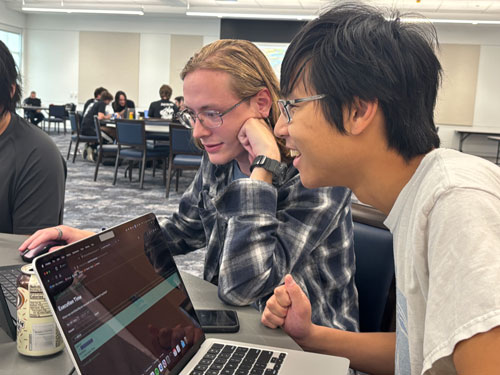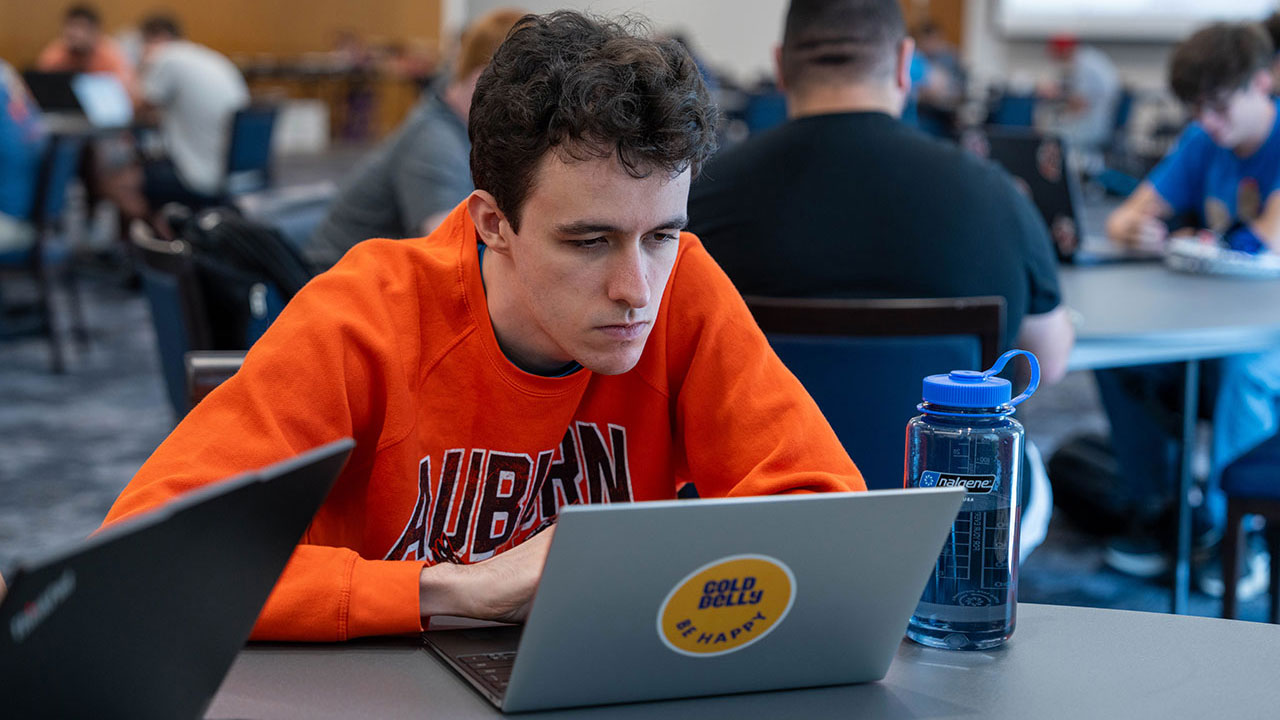Cracking codes, tracking threats: Auburn hosts university’s largest Cyber Fire Puzzles Competition to date
Published: Aug 29, 2025 12:50 PM
By Joe McAdory
They cracked codes, traced digital footprints, reverse-engineered malicious software and hunted hidden vulnerabilities. For three days, 100 students tackled real-world cybersecurity challenges at the U.S. Department of Energy’s (DOE) Cyber Fire Puzzles competition, hosted for the seventh time by Auburn University.
Held Aug. 22–24 in the Brown-Kopel Center, the event was co-organized by the Auburn University Ethical Hacking Club (AUEHC) and co-sponsored by the Auburn University Center for Artificial Intelligence and Cybersecurity Engineering (AU-CAICE), with puzzles designed and facilitated by cybersecurity professionals from the DOE Cyber Fire Program.
“Our goal is to give students a mental workout that is representative of the skills needed to perform real-world cybersecurity work,” said Daniel Tauritz, the COLSA Corporation Cyber Security and Information Assurance Endowed Professor in the Department of Computer Science and Software Engineering (CSSE), who also serves as Auburn University’s director for national laboratory relationships. “These puzzles are designed by DOE and Los Alamos National Laboratory (LANL) researchers to reflect the challenges cybersecurity professionals face in protecting critical infrastructure, detecting threats, and responding to attacks.”
Participants formed 24 teams to solve challenges modeled after scenarios faced daily by cybersecurity professionals working in critical infrastructure, national security and private industry. Problems ranged from beginner-friendly tasks to expert-level puzzles, spanning cryptography, forensic data recovery, malware analysis, reverse engineering, packet capture analysis and more.
Cyber Fire Puzzles at Auburn began as a campus-focused competition and has grown into a regional event. While Auburn University has hosted Cyber Fire Puzzles since 2020, this year marked its largest field yet, drawing 103 total registrations — including 12 students from the University of Alabama and seven from the University of South Alabama.
Students represented multiple Auburn University colleges and disciplines, from computer science and software engineering to electrical and computer engineering, aerospace engineering, mechanical engineering, the Harbert College of Business, College of Sciences and Mathematics, and the College of Architecture, Design and Construction.

“Cybersecurity isn’t just a computer science problem anymore,” Tauritz said. “Hosting students from multiple Auburn colleges competing alongside students from other universities within the state shows how interconnected these challenges are — and why diverse perspectives make teams stronger.”
This year’s event also had a full-circle moment. Aaron Scott Pope, Tauritz’s first Auburn doctoral graduate (2020) and now a cybersecurity researcher in LANL’s Advanced Research Cyber Systems Group, helped facilitate the competition.
“Dr. Tauritz’s mentorship was pivotal in preparing me for the work I do now, and it’s exciting to watch Auburn students develop the same problem-solving skills that national labs and industry leaders need,” Pope said. “When I was a student, I really appreciated how engaged Dr. Tauritz was with all the students who participated in various organizations. That’s why he maintains such lasting relationships with students even after they graduate. He has a cohort of students who go to the lab and stay connected with him. That’s honestly the reason I’m still involved with him to this day.”
For students, Cyber Fire Puzzles delivered more than just a competition — it offered a practical, career-ready experience.
“These puzzles taught me how to break down complex problems and work under pressure,” said Eirik Mulder, a senior double-majoring in aerospace engineering and CSSE, and a 2025 Astronaut Scholar. “I learned new tools and techniques I can apply directly to my classes and future projects.”
Luke Robinson, a senior in CSSE and the AUEHC president, said the competition shows participants how essential teamwork and “leaning on each other’s strengths” are in cybersecurity.
“I’ve been doing this competition for four years, starting when I was a sophomore,” he said. “Cyber Fire Puzzles was the first thing I ever did in cybersecurity. I realized it was a lot of fun. I loved solving the puzzles and wanted to know more.
“This competition not only gives beginners like I was a chance to get involved, but it also helps experts — like me now and some graduate students — go deeper into specific topics. There are expert categories in reverse engineering, network analysis, memory analysis, everything. From sparking new interest in cybersecurity to leveling up existing expertise, it’s beneficial across the board."
For Tauritz, Auburn’s commitment to hosting Cyber Fire Puzzles is about more than annual bragging rights.
“Cyber Fire Puzzles strengthens Auburn’s partnerships with LANL and DOE, builds our reputation as a leader in cybersecurity, and prepares students for high-impact careers,” Tauritz said. “Every year, we see students leaving with more confidence, sharper skills and a clearer sense of how they can make a difference.”
With record participation and expanding regional involvement, Tauritz said Auburn is positioning itself as a training ground for the next generation of cyber defenders.
“We’re helping students build an adversarial mindset — the ability to think like an attacker so they can better defend systems,” he said. “Whether they go into cybersecurity or another engineering field, that mindset makes their work more resilient, more thoughtful and ultimately more impactful.”
Media Contact: , jem0040@auburn.edu, 334.844.3447
Problems ranged from beginner-friendly tasks to expert-level puzzles, spanning cryptography, forensic data recovery, malware analysis, reverse engineering, packet capture analysis and more.


